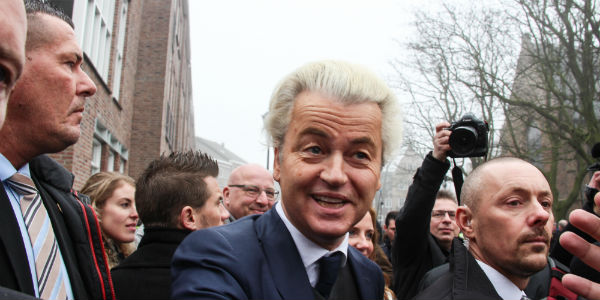Shaping the electoral success of populism: the effects of attributing blame on populist vote choice
Populist messages simplify highly complex political issues by pointing the finger at culpable elites. Michael Hameleers (University of Amsterdam) examines how exposure to media messages that blame corrupt national and European leaders for the problems citizens face affects people’s preferences and so contributes to the success of populist parties.

Geert Wilders campaigning. Picture: Peter van der Sluijs (via CC BY-SA 4.0-3.0-2.5-2.0-1.0/ Wikimedia Commons)
Populism continues to draw the attention of scholars, media and the public all around the globe. Not surprisingly, many electoral events are increasingly interpreted in the light of the alleged surge of populism. Two of the most salient and recent examples are the election of Donald Trump to the US presidency and the Brexit referendum in the UK. Against the backdrop of recent electoral successes of populism on the left and right, empirical research has started to explain the rise of populism from different supply-side factors. The media are regarded as one of these central factors. However, one of the most crucial questions has remained unanswered: how can exposure to populist messages shape populist voting? And which citizens are most likely to be influenced by populist messages?
Augmenting the gap between us and them: the effects of blame–framing on vote choice
To answer these questions, we conducted an experiment with Dutch voters in which we manipulated the core idea of populist messages in a European setting: attributing blame for the problems of the deprived ordinary people to the ‘corrupt’ elites in government or the European Union. The results demonstrated that such antagonistic populist messages increased the likelihood of voting for a right-wing populist party, in this case Geert Wilders’ Freedom Party. Interestingly, these messages attributing blame negatively affected voting preferences for the largest party in government. These findings demonstrate that exposure to messages that blame the elites widens the gap between the government and populist challengers. As a result of the spread of populist ideas by the media, voters get closer to populist parties and are further removed from the elites in government.
They did it to us: the role of identity concerns among the susceptible electorate
Support for populist parties is argued to be highly polarised: you are either with them or against them. This is reflected in the strongly differing responses to the successes of Trump and Brexit. Likewise, populist blame attributions have different effects for different groups of citizens. Specifically, attachment to national identity vis-à-vis the European identity is a crucial factor that shapes the persuasiveness of the populist blame game. People with strong attachments to the Dutch national identity are affected strongest by messages that blame the elites in government or Europe. This means that the more people identify with the national in-group of citizens, the more likely they are to vote for populist parties. At the same time, exclusionist perceptions of identity drive the effects of the populist blame game on populist voting: the more people feel distant to the European identity, and the closer they feel to the nation-state, the stronger the effects of populist blame shifting. In the end, this means that considerations of belonging play a central role in the acceptance of populist messages: the more voters feel part of the victimised ordinary people, and the more distant they feel from threatening Europe, the more susceptible they are to be swayed by populist messages.
Punishing the culprits: the connection between scapegoating and voting
If we delve deeper into the process by which populist blaming influences the electorate’s vote choice, we can see that populist messages first need to be accepted before they affect vote choices. Specifically, this means that voters first align their perceptions of blame with the populist message before aligning their party preferences. This provides support for the rationality of people’s political decisions. Populist messages simplify highly complex political issues by pointing the finger at the culpable elites. The argument made is that, because of the elite’s self-interests, corruption and neglect, the ordinary, hard-working citizens are deprived of their deserved privileges. To restore the in-group’s status in the face of threat, the corrupt elites should be punished. The only effective resource citizens can rely on is voting. Hence, elections provide the perfect opportunity to hold the elites accountable for their failures: the populist political parties that promise to restore the status of the people’s in-group and to exclude the elites should be elected, and the elites should lose power. People thus rely on their agency to not vote for the responsible elites and to vote for the populist parties that give the power back to the people.
Democratic implications: can the media fuel the success of populism?
The results of this experiment indicate that the media does have an effect on populist voting: people become more aligned with right-wing populist parties when the media assigns blame to the elites in the national government or the European Union. At the same time, the electorate becomes more distant to the national government when the media blames them for salient national problems. What does this mean for the functioning of democracy?
It can be argued that populist messages foster political polarisation. Because of exposure to like-minded populist content, people identify more with the in-group of ordinary people and become more distant to the government and people with other views. People that do not feel attached to the nation, however, are not affected by such content. In this setting, the question remains whether people are actually exposed to populist content on a regular basis. In line with recent research on ‘filter bubbles’ and selective exposure, it can be argued that people avoid populist content when they do not like it, and select it when they agree with such viewpoints. Such selection biases may however further augment polarisation: those that already agree with populist viewpoints become even more likely to vote on populist parties and those that disagree become further and further removed from such parties.
The question on potential antidotes remains. If we regard populism as a key democratic challenge, the fact that exposure to blame attributions can affect populist voting behaviour is problematic. A potential antidote is to relativise the claims on responsibility, hereby demonstrating that the elites are not the sole cause of the people’s perceived deprivation. Still, it is crucial that the people’s sense of deprivation is not ridiculed, which may only be used as ammunition for the populist challengers. Moreover, polarisation can be overcome by balance, showing that different actors have some responsibility in causing pressing societal problems. What matters is that people are exposed to challenging information whilst overcoming resistance to attacks on their existing beliefs.
The article gives the views of the author and not Democratic Audit. It is based on the paper ‘Framing blame: toward a better understanding of the effects of populist communication on populist party preferences’ by Michael Hameleers, Linda Bos & Claes de Vreese, published in the Journal of Elections, Public Opinion and Parties.
About the author
 Michael Hameleers is Assistant Professor of Political Communication at the University of Amsterdam (ASCoR). His research interests include framing, polarisation, misinformation, (media) populism and the role of identity in media effects.
Michael Hameleers is Assistant Professor of Political Communication at the University of Amsterdam (ASCoR). His research interests include framing, polarisation, misinformation, (media) populism and the role of identity in media effects.





 Democratic Audit's core funding is provided by the Joseph Rowntree Charitable Trust. Additional funding is provided by the London School of Economics.
Democratic Audit's core funding is provided by the Joseph Rowntree Charitable Trust. Additional funding is provided by the London School of Economics.
Very helpful description of classic in-group / out-group behaviour. I’m assuming that this is genetic hardwired behaviour as part of evolution involving conflict particularly between rival groups or gangs.
But there’s massive difference between on the one hand Trump’s election and the UK Brexit referendum – and on the other Geert Wilders. And that’s due to democracy.
Wilders and the Freedom Party got 20% of the vote in 2017 – and under a multi-party democratic PR system got a mere 20% of the 150 seats.
In the US, the undemocratic first-past-the-post presidential election was reduced to only two candidates. Inevitably what starts as oppositional behaviour then leads on to extremism. So the most populist leader or party will win. The same behaviour was clearly demonstrated in the UK Brexit referendum.
The antidote to populism is to pump up democracy.
The “exam passing classes” or “anywheres tribe” have cheated the rest for decades, in the UK led by the “smugbstardsatthebeeb”. If us exam passing classes want to challenge populism, let’s grovel & say we are very,very sorry, humbly beg for forgiveness and promise to do better, hoping that we can influence those who have been stuffed by our globe-trotting, exam-passing NIMBYism.